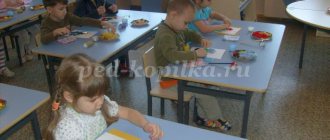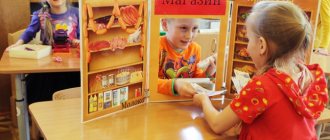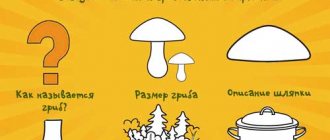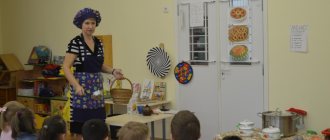MAGAZINE Preschooler.RF
Project “School of a young guide” for children of senior preschool age 6-7 years oldMunicipal budgetary preschool educational institution kindergarten No. 36 “Yablonka”
Project “There is such a profession” : “School of a young guide” for children of senior preschool age 6-7 years old
Prepared by the teachers of the Strawberry :
- V. D. Kosolapova,
- I. V. Kalinovskaya
Surgut, 2022
Relevance.
In our time of scientific process, the issue of moral and aesthetic education of children is acute. Morality, traditions, love often become just abstract concepts.
It is in kindergarten that children receive the first information about various phenomena of life, absorb respect for their village, for their Motherland, learn a lot of new and interesting things about their past and present, and get acquainted with the masters who create beauty: artists, sculptors. Therefore, it is extremely important during this period to create an inspired environment around the child, to develop an aesthetic attitude towards it; to prepare a preschooler not so much informationally as emotionally to perceive a work of art.
Excursions reveal wide opportunities for the child’s perception, as well as for the education of museum culture. With the help of an excursion, you can teach preschool children not only to listen, but also to hear, not only to watch, but also to see and observe.
An indispensable condition for the comprehensive development of a child and for his successful education at school is the ability to communicate with adults and peers. According to the literature and our own observations, the majority of children entering school experience significant difficulties and do not have sufficient coherent speech skills for this age.
Project type: educational - practical
Duration: long-term
Project participants: preparatory group children, teachers, parents.
Problem:
Children's monologue and dialogic speech is insufficiently formed; there are no skills and culture of speech etiquette with peers and adults.
Objective of the project:
Involve children in joint activities with the teacher, improve children’s monologue and dialogic speech, expand the vocabulary with some terms, help overcome shyness, teach children to behave confidently, and enter into conversations with unfamiliar children and adults. To create conditions conducive to instilling museum culture in preschoolers through excursion activities.
Tasks:
- Introducing children to the profession of a tour guide, the features of the work and the main directions. Preparing preschoolers to lead excursions.
- Teach children the techniques of museum activities as a tour guide;
- Develop search and cognitive activity;
- To develop joint activities between children and adults based on museum practice;
- Enrich children's speech and active vocabulary by developing a certain amount of information in them;
- Develop skills in constructing coherent monologue and dialogic statements;
- Develop intonation expressiveness and tempo of speech;
- Develop the ability to engage in conversation, express your thoughts emotionally and meaningfully;
- Development of coherent monologue and dialogic speech.
- Introducing children to national and world culture.
- Education of museum culture.
Hypothesis
When a child comes to school, a class where children are engaged in common activities, and he needs to have fairly flexible ways of establishing relationships with other children, he needs the ability to enter the children's society and act together with others. Full communication involves not just the exchange of information, but such interaction between partners in which they respect each other’s personality, are ready for new forms of communication, a new attitude towards the world around them and themselves, determined by the situation of schooling, thanks to which they could communicate with others children, adults. For a child, the main thing is personal communication, the exchange of feelings and experiences, the search for mutual understanding, the ability to competently build a dialogue and establish emotional contact with the interlocutor. Of course, not every child can be raised to be a “talker” (V.V. Zelensky’s term), but it is still possible to develop the ability to accurately express one’s thoughts, fully participate in a conversation, and much more. Kindergarten is the first and very important stage of the general education system. Therefore, in kindergarten, it is necessary in every possible way to support the initially inherent need for communication in a small child, to develop the ability to conduct dialogue with each other, and to increase his self-esteem. After all, it is in dialogue with peers that children gain experience of equality in communication, learn to control each other and themselves, learn to speak clearly, coherently, ask questions, answer, reason, argue, express suggestions and wishes. This is a special lexical layer that is closest to children, which helps to carry out interpersonal communication, serves as a means of communication, and most clearly expresses the likes or dislikes of children.
For the development of emotional vocabulary, it is necessary to create conditions in which each child could express his emotions, feelings, desires and views, not only in ordinary conversation, but also publicly, without being embarrassed by the presence of outside listeners. The habit of expressive public speech can be cultivated in a person only by involving him in speaking in front of an audience from childhood.
To implement the idea and concept of the project, it is necessary to use new innovative forms of working with children. The introduction of a non-traditional form of work in this direction is also confirmed by the Concept of Preschool Education, which identifies the main guidelines for updating the content of the educational system within a preschool institution. It provides guidance on the personal identity of each child. A preschool institution is designed to create conditions for the intellectual, creative, emotional, and communicative development of a child and prepare him for school. We suggested that organizing a “School of Guides” .
Innovation of the project.
It consists of combining work on speech development with older preschoolers with the child’s role-playing activities (acting as a guide) and preparing them for school. And also in integrated, innovative training, which helps to avoid the same type of learning goals and functions.
To achieve these goals, our group is working on the topic “Formation of coherent speech in children through the project “School of a Young Guide” , within the framework of which work is carried out on competent, expressive speech, correction of its deficiencies, on fostering a culture of communication, and developing the ability to use speech as a means of communication for further successful socialization
Expected result:
- Improving the culture of behavior of older preschoolers in public places.
- Increasing children's interest in the profession of a guide, expanding children's knowledge about people working in museums, increasing interest in mini-museums of preschool educational institutions.
- Formation of communication skills.
- Development of free communication between preschoolers and adults and children.
Project perspective:
- Creation and training of a subgroup of children - guides to work together with adults in mini-museums of preschool educational institutions.
- Creation of a bank of excursions.
Monitoring:
Questionnaire by L.V. Kutsakova monitoring is carried out in the form of a conversation with children.
Project implementation:
Forms of working with children:
- excursions
- play activity
- conversations
- reading fiction
- children's exhibitions
Forms of work with parents:
- consultations
- excursions with the whole family
- online excursions
- survey
Project implementation stages:
- preparatory;
- main stage (training children as tour guides);
- final stage (improving acquired knowledge
children - guides in mini-museums of preschool educational institutions).
The result of the project is the creation of a LAPTOP.
I. Preparatory stage.
1. Fostering a culture of behavior for children in public places:
- Conversations, looking at pictures about the rules of behavior in public places.
- Conversations, reading and discussion of works by children's writers.
- Plot-role-playing game “Group tour” .
- Observations of children - guides on the behavior of preschool children in mini-museums of preschool educational institutions.
- Introducing children to professional holidays.
2. Introduction to the profession of a tour guide:
- Looking at paintings, talking about the profession of a guide.
- Excursions for children around the city, virtual excursions.
- Children’s visit to the museum in MBDOU No. 36 “Yablonka” . ” A conversation about the work of a guide following an excursion.
- Clarification of the stages of the tour guides after visiting the museum.
- Excursion to mini-museums for kindergarten groups. Analysis of the excursion by the teacher.
II. Main stage. Training of children as tour guides.
- Viewing the exhibits. Accumulation of a vocabulary, including terms, learning the correct pronunciation of words.
- Drawing up an excursion plan. A selection of poems, riddles, educational games, role-playing games, and quizzes.
- Practical assimilation of the course of the excursion, work on expressiveness and tempo of speech.
- Creating a lapbook “Professions”
III. The final stage. Improving the knowledge gained by children-guides in mini-museums of preschool educational institutions.
- Excursions with the help of a teacher.
- Self-guided excursions for children
preparatory group.
- Self-guided tours for parents and children, virtual tours.
| Next > |
The child was left for the second year in the preparatory group of the kindergarten. What to do?
It often happens that a child graduates from kindergarten at 6 years old. There's still a year left until school. And where to conduct it is unclear. Either go back to the preparatory group, or to grade zero, or even to school. Is it legal to leave a child in kindergarten for the second year and what should parents pay attention to in this case?
Useful Mela newsletter twice a week: Tuesday and Friday
SUBSCRIBE
Question.
The child is 6 years old, he graduated from the preparatory group of the kindergarten, but the neurologist insisted that the boy is not yet ready for school. There are seven such children in our kindergarten. The head decides to send them back to the preparatory group. I am worried that the children will not be adequately prepared for school (we have already paid for a speech therapist). Is this considered a violation?
Answer:
Only children who, on September 1 of the current year, will be at least 6 years and 6 months and no more than 8 years old are accepted into the first grades of Moscow schools.
The decision to admit a child under 6 years and 6 months to school is made on an individual basis and only after the child has been diagnosed by a speech therapist and psychologist.
The practice of a child spending two years in the preparatory group of a kindergarten is quite common. In some cases, this is due to the fact that the child went to kindergarten before the age of 3, in others, due to the parents’ decision to postpone school and let the child play enough, grow up and mature psychologically.
Neuropsychologists and neurophysiologists say that the development of mental functions to the required level occurs differently in all children. And some children at 6.5 years old are already ready to go to first grade, while others, despite their well-developed intellect and broad outlook, still “play with dolls” and are not ready to sit through a full lesson even at full 7. And there is nothing in this scary.
The second year of pre-kindergarten is just another year of kindergarten.
Depending on how the system is built in a given preschool institution, the child will either remain with his old teacher, if each age group has its own preschool teacher, or will end up with a new one, if the teacher takes a younger group and leads it before school.
In any case, throughout the year the child will also be involved in all developmental activities in the program according to his age.
You can get acquainted with the program of developmental classes from the senior teacher of the preschool institution, and also, as a rule, on the official website of the school.
In addition, parents have the opportunity to independently choose additional classes for their child to prepare for school through the government services portal - any educational institution operates such clubs, both paid and free. There are also classes for preschoolers there.
Instructions for registering for school preparation or other clubs:
Step 1:
Go to mos.ru or the government services portal in your region.
Step 2:
In the catalogue.
Step 3:
Select “Enroll in clubs, sports sections, creativity houses”
Step 4:
Search for “Introduction to school life”
Step 5:
Select a group that suits your location.
Preschool institutions are part of the educational complex, and often elementary school teachers organize groups for preparation and adaptation to school on the territory of the kindergarten or offer to attend “preparatory classes” on the school grounds. Usually this is 1.5-2 hours twice a week in the afternoon (after a quiet hour in kindergarten).
The decision about a child’s readiness for school and the maturity of all his functions is not made by a neurologist. To do this, you need to undergo a speech therapist and a child psychologist. If parents have doubts about the specialist’s conclusion or want to get additional advice, they can seek specialized help from:
- GPPC (City Psychological and Pedagogical Center);
- Central Psychological-Medical-Pedagogical Commission;
- FRC PMPC (Federal Resource Center PMPC, a structural division of the Center for the Protection of the Rights and Interests of Children).
Anna Poilova, lawyer:
Parents are the legal representatives of their children and act in defense of their rights and interests in relations with any individuals and legal entities (Article 64 of the Family Code). It is the parent who independently decides whether the child should go to school or stay in kindergarten.
All issues related to the upbringing and education of children are resolved by parents by mutual consent, based on the interests of the children and taking into account the opinions of the children.
Whether a child attends school or stays for another year in kindergarten is decided only by the parent or other legal representative of the child, taking into account psychological and pedagogical examination, the conclusion of a neurologist, speech therapist and other specialists. The head of the kindergarten cannot make such a decision.
In case of a controversial situation, the child’s legal representative always has the right to contact the administration of the educational institution or the following departments:
- Courts of general jurisdiction;
- Prosecutor's Office;
- Department of Education and Science of the City of Moscow.
Ask your question to “Mel”, and the editors will find someone who can answer it. Write to our social networks - we read all messages on pages on Facebook, VKontakte and Odnoklassniki. You can also write to us on Instagram. Answers will be published in order in the “Question - Answer” section. By the way, we do not reveal names, so questions can be anything (feel free!).
Photo: Shutterstock/OlegRi
Preschool children's first meetings with school
Graduation has passed for future first-graders and soon yesterday's preschoolers will sit down at their desks. In order for children to enter “adult” life comfortably and without stress, kindergarten helped them adapt to school throughout the year.
For a whole year, the children were taught not only to read and write, but also slowly introduced to school life. This approach was made possible by combining schools and kindergartens into one organization. Excursions and quests around the school, festivals and competitions with schoolchildren - all this was done so that on September 1, first-graders did not feel like frightened newcomers at school.
Thus, in Moscow school No. 2065, a quest “Journey around the school” is held for children from kindergarten. The children and their teachers, while completing assignments, walk around the classrooms, foyers, laboratories, the cafeteria, the gym, learn about the subjects taught at school, learn about the responsibilities of schoolchildren, and even sit with them at a desk in class, and then kick the ball together in the gym. Children get used to school and when they become first-graders, the walls will be, although not “familiar,” but well known. Primary school teachers come from school to visit preschool children. They communicate with children, draw, make appliqués, and play together at the same table. This is how a trusting relationship develops, and children in 1st grade will no longer perceive the teacher as a stranger. Schoolchildren also come to the groups to play with the “younger generation”, give them performances, tell them about school, and read fairy tales. Children are drawn to older children and enjoy their company.
At school No. 1354 “Vector”, so-called “free Fridays” are held for the socialization of children. Boys and girls walk absolutely freely throughout the kindergarten, from group to group, from playground to playground along one of the quest routes that they choose themselves. The themes of Fridays are different: “Travel to cold countries”, “Travel in sneakers”, “Epics, fairy tales and epics of different nationalities”, “Parade of the planets”. In one play hour, the child learns a lot of new things, plays with peers, and is creative. Most importantly, preschoolers learn to make decisions on their own, where to go, what to do, with whom and what to play. Children get to know each other, learn to communicate, and are not afraid to be in a new place with unfamiliar children. After the game, everyone gathers in a group and shares their impressions, tells what they did and saw, learns to listen to their interlocutor, convey their emotions and impressions, and this skill will be useful to them both at school and in life.
Students from school No. 2120 made busy boards for the kids with their own hands. Schoolchildren studied the benefits of educational toys and the technology of creation, assembled locks, hooks, and other parts, polished boards and made several busy boards for kindergarten. The older comrades brought them to the kids and played together.
And at school No. 2117 they came up with the project “Simply about the complex.” High school students show preschoolers experiments in physics and chemistry. They stage performances and concerts for them during the holidays. The most amazing thing is that tenth graders themselves take the initiative and spend their leisure time with the kids: they organize competitions, play outdoor or board games. Schoolchildren become mentors for children.
School No. 1391 developed the “Umka” program, but not for learning the basics of literacy, but for the socialization of children. Twice a week children play, travel around the school and learn the rules of behavior at school: how to sit at a desk, what a lesson is and whether it is possible to walk around the classroom during it.
At school No. 1368, every academic year, starting in October, preparatory students and teachers come to school for classes that take place... in the library. Teachers tell children about books, about what future first-graders will learn once they learn to read. And when the school hosts assemblies dedicated to Victory Day, or concerts, festivals, exhibitions, preschool children participate on an equal basis with schoolchildren in all activities. We can say that children from kindergarten are full participants in the life of the school, they are included in it and perceive kindergarten as the first stage of school life.







